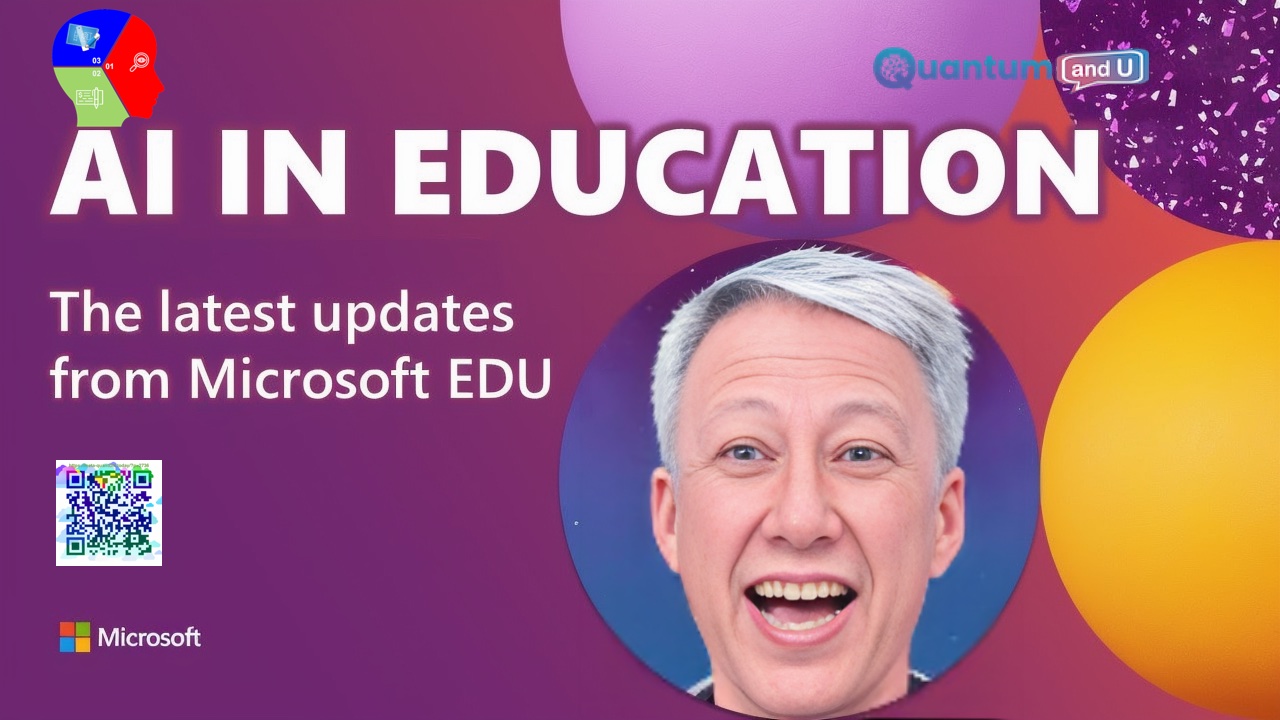
Introduction:
In this presentation, Mike Tholfsen, a member of the Microsoft education engineering team, discusses the latest developments in Artificial Intelligence (AI) applications in education by Microsoft EDU. He covers a wide range of AI topics, its increasing impact on education, and how Microsoft incorporates this cutting-edge technology into its educational products. This thorough examination offers a glimpse into the future of learning.
AI Education from Microsoft EDU:
Microsoft EDU is embracing AI (Artificial Intelligence) and its potential to revolutionize education. Their approach focuses on two main areas: empowering educators and equipping students with AI skills.
Empowering Educators
- AI-powered tools: Microsoft offers various AI tools within their products like Microsoft 365. These tools, like Learning Accelerators, automate tasks, personalize learning experiences, and provide educators with valuable insights into student progress.
- Increased Efficiency: AI helps streamline administrative tasks and content creation, freeing up valuable educator time for more individualized student interaction.
- AI for Educators Training: Microsoft provides educators with resources and training to understand and leverage AI effectively in the classroom https://learn.microsoft.com/en-us/training/educator-center/topics/ai-for-education.
Equipping Students with AI Skills
- AI Literacy: Microsoft aims to develop students’ understanding of AI concepts and its responsible use.
- Learning by Doing: Students get hands-on experience with AI tools like Microsoft Designer, which allows them to create content using AI-powered imagery and text generation.
- Preparing for the Future: By familiarizing students with AI, Microsoft EDU helps prepare them for the future workforce, where AI is expected to play a significant role.
VIdeo of AI in Microsoft Education (EDU):
Related Sections of the above video:
- Partnership with OpenAI: Microsoft’s long-standing partnership with OpenAI is emphasized, particularly in integrating leading AI models like ChatGPT and Dolly3 into their software.
- Responsible AI: Tholfsen discusses Microsoft’s commitment to responsible AI by incorporating principles of fairness, reliability, safety, inclusiveness, and transparency into their products and processes.
- Microsoft Co-pilot: Tholfsen introduces Microsoft Co-pilot, which harnesses powerful AI models like GPT-4 Turbo and Dolly3 to aid educators. He highlights its availability at no extra cost, transparency in sourcing, continuous updates, and robust data protection.
- Co-pilot Demo: Tholfsen demonstrates how Co-pilot functions across various platforms, including web, mobile, Windows, and Bing. He showcases its capabilities in generating lesson plans, creating tables, crafting images, and even assisting with system navigation.
- Learning Accelerators: Tholfsen discusses Microsoft’s focus on learning accelerators, which encompass foundational and future-ready skills integrated with AI insights. He presents tools like Reading Progress and Reflect aimed at enhancing reading fluency and student well-being.
- Standalone AI-Powered Reading Coach: Tholfsen introduces the standalone AI-powered Reading Coach, emphasizing personalized, engaging, and consistent practice to improve reading skills. He showcases its features, including story generation, progress tracking, and gamification elements.
- AI-Powered Creativity Tool: Tholfsen presents the AI-powered creativity tool, Designer, which aids in generating imagery and text for educational purposes. He highlights its popularity among educators for creating engaging social media prompts.
Impact of Microsoft EDU’s AI Initiatives in Southeast Asia:
Microsoft EDU’s AI programs hold significant promise for Southeast Asia’s education sector, but also come with challenges to consider. Here’s a breakdown of both:
Opportunities:
- Personalized Learning: AI can cater to the diverse learning styles and paces prevalent in Southeast Asia. This can improve educational outcomes and address the region’s existing achievement gaps.
- Teacher Training and Support: AI tools can automate administrative tasks, freeing up teachers for more professional development using Microsoft’s AI for Educators training. This can enhance teacher skills across the region.
- Bridging the Digital Divide: AI-powered language translation tools within Microsoft products can potentially bridge the language gap and make educational resources more accessible in Southeast Asia’s multilingual environments.
Challenges:
- Digital Infrastructure: Uneven access to technology and reliable internet connectivity in Southeast Asia can hinder widespread AI implementation.
- Teacher Training and Adoption: Equipping educators with the necessary skills and confidence to use AI tools effectively requires robust training programs and support structures.
- Data Privacy: Ensuring student data privacy and security within AI-powered platforms is crucial, especially with stricter data protection regulations emerging in Southeast Asia.
Overall, Microsoft EDU’s AI initiatives present a valuable opportunity for Southeast Asia, but successful implementation hinges on addressing the digital divide, providing adequate teacher training, and prioritizing data security.
Here are some additional points to consider:
- Local Innovation: There’s potential for local developers in Southeast Asia to create AI-powered educational tools specifically tailored to the region’s needs and languages.
- Collaboration: Collaboration between governments, educators, and tech companies is essential to ensure equitable access to AI education across Southeast Asia.
Conclusion:
Mike Tholfsen concludes the review by highlighting the transformative potential of AI in education and Microsoft’s dedication to providing innovative tools for educators and students. The video emphasizes the significance of responsibly integrating AI and provides insights into its practical applications across various educational scenarios.
In summary, Microsoft EDU’s AI Education Initiative provides educators with the tools and knowledge to customize learning, and empowers students with the skills required to succeed in an AI-driven world.
By addressing these challenges and promoting collaboration, Southeast Asia can utilize the power of AI to revolutionize its educational landscape and empower future generations.
Key Takeaway Points:
- Microsoft’s partnership with OpenAI fuels advancements in AI integration for education.
- Responsible AI principles guide the development and implementation of educational tools.
- Microsoft Co-pilot offers powerful AI assistance for educators at no extra cost, ensuring transparency and data protection.
- Learning accelerators like Reading Progress and Reflect enhance student learning and well-being through AI insights.
- The standalone AI-powered Reading Coach provides personalized practice to improve reading skills.
- The AI-powered creativity tool, Designer, facilitates engaging content creation for educational purposes.
References:
- Microsoft EDU: https://education.microsoft.com/
- OpenAI: https://openai.com/
- BET Conference: https://www.bettshow.com/
- Microsoft Co-pilot: https://copilot.microsoft.com/
- Reading Progress: https://www.microsoft.com/en-us/education/products/reading-progress
- Designer: https://education.microsoft.com/en-us/resource/d7e588b3


